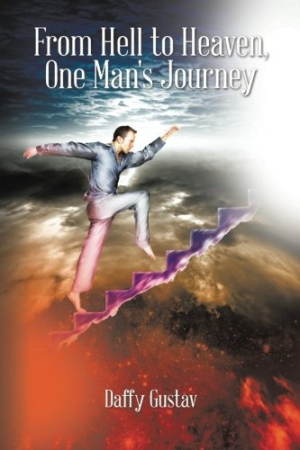From Hell to Heaven, One Man's Journey
Gustav’s in-the-moment reactions to his feelings of betrayal are easy to relate to.
Reflecting on divorce and other personal betrayals, Daffy Gustav shows the religious road to recovery in From Hell to Heaven, One Man’s Journey. The book was inspired by an acrimonious divorce and other family troubles.
Gustav recounts how his wife, a bored stay-at-home parent, pursued sexual experience outside of marriage. Divorce left him depressed and purposeless, but he tried to earn his children’s understanding and threw himself into his work for water treatment and engineering companies. Delving deep into emotions, these poems also discuss friendship, further betrayals (aided by their mother, his brother stole from him), and second chances (marrying again). Faith in God aided in this healing journey; later verses are more spiritual and measured.
Although Christian faith helped him adjust his thinking, many of these poems still feel like the angry outpourings of a man with an ax to grind. Moreover, formulaic rhyming and poor spelling and grammar mar this overlong collection.
Early poems paint Gustav’s ex-wife as a backstabbing gold digger. He chooses appropriately martial metaphors to describe their relationship: “I was her dartboard” and “Her shield is the kids.” However, the poetry can edge toward misogyny, as in “Remorseless Bitch.” Unpleasant vocabulary reinforces the irate attitude: “The decision is made to dump the blood sucker / … all I feel is a realization of being fucked over.” Elsewhere he expresses disappointment with his Cal Poly experience, adding a seemingly xenophobic jab at foreign-born professors: “I wondered with their poor pronunciation, how they could teach here.”
The tone gradually grows less bitter as faith becomes a larger influence in the author’s life. In the second half, a number of poems end with dated explanations of the occasion; often a sermon or Bible study inspired the composition. This sense of progression is welcome after the apparently random organization of the earlier material. Then again, the most interesting verses are those that sidestep central themes; a few about Christmas and one about a visit to China instilling gratitude for American freedoms are among the standouts.
An insistence on rhyming, usually in an abab or aabb pattern, sometimes entails making up words. One or two neologisms seem deliberate, even clever (“usery”), whereas “stayage,” “comparatal,” and “stabilance” look like mistakes. There are many typos, grammatical errors, and phonetic spellings (“phalasy,” “conoider,” and “emersed”). Three poems are printed twice.
It would take a professional copyeditor to hone this into a concise set of linguistically and stylistically acute poems. However, the author’s in-the-moment reactions are easy to relate to.
Reviewed by
Rebecca Foster
Disclosure: This article is not an endorsement, but a review. The publisher of this book provided free copies of the book and paid a small fee to have their book reviewed by a professional reviewer. Foreword Reviews and Clarion Reviews make no guarantee that the publisher will receive a positive review. Foreword Magazine, Inc. is disclosing this in accordance with the Federal Trade Commission’s 16 CFR, Part 255.

